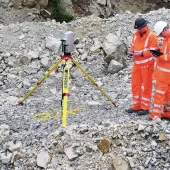Suspension of Aggregates Levy exemptions

HMRC sets out plan to suspend certain exemptions, exclusions and reliefs during EC investigation
HM Revenue & Customs Brief 31/13, published earlier this month, sets out how the Government proposes to suspend certain Aggregates Levy exemptions, exclusions and reliefs that are currently the subject of a European Commission (EC) investigation.
Essentially, under state aid rules, HM Revenue & Customs (HMRC) must either tax all aggregates or tax none. The Government has taken the view that taxing the materials that are currently being investigated by the EC is the most appropriate way in which to meet its obligations under Article 108(3) of the Treaty on the Functioning of the European Union (TEFU).
As a result, certain materials, as detailed in Brief 31/13, will become taxable on 1 April 2014 and legislation will be included in next year’s Finance Bill. Anyone wishing to comment on the proposed suspensory measures should register their interest in order to receive HMRC’s questions, to which responses will be required by 15 November.
The British Aggregates Association (BAA), which is lobbying UK MPs to have the Levy abolished in its entirety, says HMRC will face major problems in complying with EU law, as it will not simply be a case of removing exemptions.
BAA director Robert Durward explained: ‘In many cases, they will have to identify and approach companies who are not registered for the Levy, and inform them that not only will they have to start paying £2.00 per tonne from April 2014, but that they will also be liable to pay for the previous 11 years as well. How many companies will have 11 (soon to be 12) years of sales figures, and how many, if any, could survive a retrospective payment of this magnitude?’
According to Mr Durward, quarry companies in Northern Ireland are particularly exposed. ‘They are all registered and they have all submitted Aggregates Levy returns, so HMRC has a record of their sales,’ he said. ‘NI operators had a derogation, when we were paying £1.60 they were only paying 32p and then 40p to our £2.00. The derogation was withdrawn in December 2010 and NI operators have since been having enormous problems with cross-border competition and exempt materials.’
He continued: ‘The only rational way out of this mess for all parties is for the Aggregates Levy to be scrapped and replaced by a modest levy of 10p per tonne to be used to fund projects near the operating site. This would not require any input from HMRC and would be administered by the local community council in partnership with the operating company.’
The BAA says it is disappointed that the Mineral Products Association (MPA) is not supporting its call for the Levy to be scrapped. ‘This is unfortunate but echoes the position that the then QPA adopted in 2001, whereby it declined to support our legal challenge,’ said Mr Durward. ‘It is extremely difficult for any industry to make effective representations to the authorities when its [trade] associations are so clearly divided between the interests of SME private companies and those of the remaining five majors who lay claim to 80% of all sales.’
However, Nigel Jackson, chief executive of the MPA, said: ‘The MPA, and prior to that QPA, has always stated that the Aggregates Levy is a bad environmental tax and both organizations have been consistently opposed to it. Both the Treasury and the Department for Business, Innovations and Skills (BIS) are aware of the MPA’s view, which we repeat regularly.
‘Our strategy has been to try to mitigate the rate of growth of the Levy, which to date is worth around £70 million as a result of three freezes in indexation we alone have argued for. The MPA has taken the view that government is unlikely to remove the Levy as it is ‘hard baked’ into both Treasury forecasts and environmental thinking.
‘We have been aware from the outset that the exemptions and reliefs would be liable to both legitimate use and abuse, and would require modification at some point with the likelihood that the Treasury would seize the opportunity to increase its tax take from the sector rather than reduce it.
‘The overriding issue for our members has been the creation of a level playing field and consistent and rigorous enforcement. The MPA has taken the view that whatever the outcome of any legal action either in the UK or EU, the Government ‘owns the goalposts’ and will move them to recover revenues whatever the justification.’









